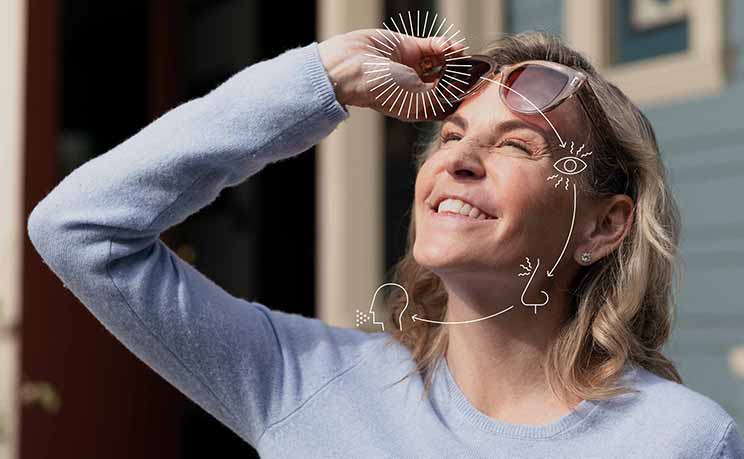AncestryDNA® Traits
Sun Sneezing
It's a bright and beautiful day outside, but you start to sneeze as soon as you walk into the sunshine. If this has ever happened to you, then you may have what’s called a photic sneeze reflex. It's also commonly described as sun sneezing. AncestryDNA® + Traits can tell you if your DNA suggests you might sneeze when exposed to bright light.


More About the Sun Sneezing Reflex
Another term for this reflex is the ACHOO syndrome, which is short for "autosomal compelling helio-ophthalmic outburst syndrome." That long name means uncontrollable sneezing in sunlight.
The reflex usually starts with a prickling sensation in your nose followed by one or more sneezes in the sun.
Interestingly it wasn't until the 1950s that this phenomenon was investigated formally. Jean Sedan, a French researcher, noticed that his patients would sometimes sneeze because of the light coming from his ophthalmoscope (device to see the eyes). He figured out that many types of bright light made them sneeze.
Genetics of the Photic Sneeze Reflex
Whether or not bright light makes people sneeze is at least partially determined by genetics.
Scientists know there are multiple markers, or locations, in your DNA that can help predict if you'll be a sun sneezer. AncestryDNA scientists have found over 2,600 DNA markers associated with this trait. Some specific genes of interest related to this trait are the ZEB2 gene, located on chromosome 2, and the NRF2 gene, located on chromosome 15.
Researchers have also discovered that photic sneeze reflex is more common among females and Caucasians. In one study, 94.3% of the photic sneezers were white, and 67% were female. Scientists aren't sure why this is true, but it's possible that genetics are responsible for these trends.
What Science Says About Sun Sneezing
Scientists aren't totally sure why some people are sun sneezers and others aren't. But one theory suggests sun sneezing may have something to do with crossed wires in the cranial nerves. The bright light causes your pupils to contract, which the nervous system misreads as nasal irritation, so you sneeze.
Since photic sneeze reflex isn't a life-threatening condition, it hasn't been studied extensively in the past. But some researchers are now starting to take more interest in sun induced sneezing, since it may shed light on other conditions that can be triggered by light, such as epileptic seizures.
Interesting Findings About Sun Sneezing
A photic sneeze doesn't mean you have a sun allergy or that you’re allergic to being outside. There are other triggers for this kind of sneezing in addition to sunshine and bright lights. For example, some people also have a sneeze response from eating mints, taking a sudden, deep breath of cold air, or from plucking their eyebrows.
As far back as 350 B.C., the Greek philosopher Aristotle wrote about sun sneezing. In his Book of Problems, Aristotle believed that the heat of the sun caused a tickle in the nose, which led to sneezing. But he couldn't figure out why the sun affected the nose when the heat of fire didn't.
References
Eriksson Nicholas, J. Michael Macpherson, Joyce Y. Tung, et al. "Web-based, participant-driven studies yield novel genetic associations for common traits." PLoS Genetics. June 24, 2010. https://journals.plos.org/plosgenetics/article?id=10.1371/journal.pgen.1000993.
Pickrell Joseph K., Tomaz Berisa, Jimmy Z. Liu, et al. "Detection and interpretation of shared genetic influences on 40 human traits." Nature Genetics. May 16, 2016. https://www.nature.com/articles/ng.3570.
Schrock, Karen. "Looking at the Sun Can Trigger a Sneeze" Scientific American. January 10, 2008. https://www.scientificamerican.com/article/looking-at-the-sun-can-trigger-a-sneeze/.
"Why Does Bright Light Cause Some People to Sneeze?" Scientific American. November 18, 2002. https://www.scientificamerican.com/article/why-does-bright-light-cau/.